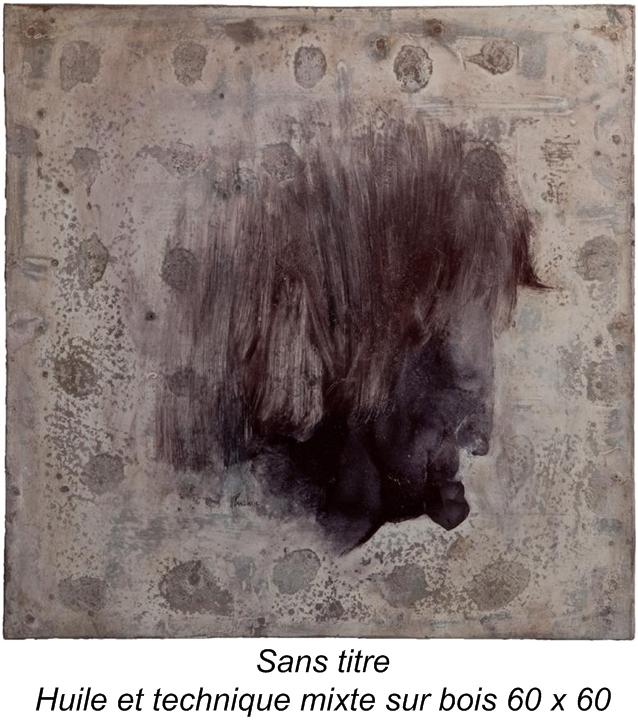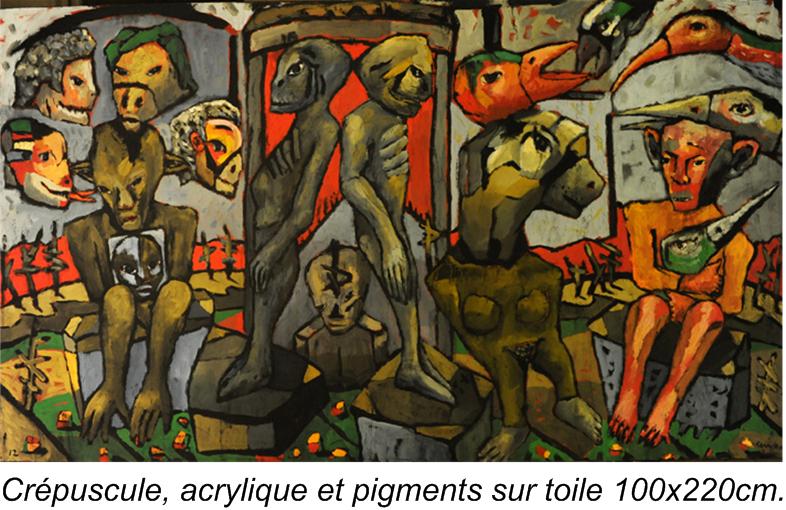Plural singularities
(Two singular artists in the art of to-day)
October 23 - November 30.
Marc Prialnic - Jean-Paul Souvraz
It may seem paradoxical to present the works of two artists so incompatible as Marc Prialnic and Jean Paul Souvraz in one same exhibition. Each of them has widened its singularity in such a singular way that their contours became strangers to one another, as those of islands in archipelago that would have become today's art. Imagination and art do not fear the contradiction nor the paradox. So we deliberately chose the contrast of these two singular expressions:
• When Souvraz exalts the color, Prialnic immerses us in the shadow of the "in there" ...
• When Souvraz leads us into a truculent carnival, Prialnic invokes the ghosts of the past ...
• When Souvraz stages some improbable creatures, half-human, half-animal, Prialnic endlessly invokes an enigmatic and faceless figure ...
Today's art is no longer confined to any current in which the criticism may inscribe the works. The age of "avant-gardes" is over. Each artist must now invent the form and content of its own singularity. Unique, he must look like no other. So is the case with Prialnic and Souvraz.
Their singular authenticity has allowed us to bring them together.
Marc Prialnic's work, is developing since ever around trace and memory. From a painting to an other in last decades, the same rituals repeat themselves. Since the support preparation, Prialnic signify the time: always using wood panels, made from reclaimed boards, meticulously chosen and gathered for the stigmata of their woods and prepared with the utmost care. Prialnic wears out, abrades and questions the traces of the wood, its stigmas, its duration.
Slowly, he digs into its depth through successive layers of plaster and paint brought in the most sparing of colours, contrasts of opacities and transparencies that enhance the dialogue between shadow and light. But who is the mysterious and ancient figure whose sole profile repeatedly appears, scratched into the delicacy of the oil and its glazes, like a haunting track, a strange incantation, medal profile, "whenever, not quite the same, not quite another" ( Verlaine ) ? Could he be an avatar of the "Erl king" that Marc Prialnic, in a previous work, had long pursued in his " Inner Forest"? Or Chronos himself, without gaze, sweeping tirelessly beings and things? Or could it be a ghost, the soul of the wood that has been roused by the artist? The enigma will remain complete and obscure like the forces of our unconscious.
There is noise in the polyphonic work of JP Souvraz , and what a contrast with Prialnic's introspective contemplation! The colours burst while we hear strange creatures leading a truculent carnival.
Souvraz tells tales, in a mischievous way, by never giving us the key to the story. The thread of reason would break as soon an explanation would be attempted, or it would get tangled into an inextricable ball of yarn. Souvraz's characters explode in your face: bright colours, interpenetration of the animal and the human, each and all are mixed at the very first glance. But after this initial shock, we absorb a wild, and singular representation, and we are immersed in the fantasy, the amazing.
Souvraz does not bother with refinements: the colours are violently contrasted, circled in black. He is listening to the primary, animal forces, which agitate beings. His painting is raw, his figures carved with a billhook. Yet, often, tenderness comes up to the surface, "my animals do not bite, they are not created to scare," he says.
Souvraz's world is deeply anchored in his Northern roots. Carnivals, masquerades, dead-eyed masks rub shoulders with Breughel the elder, James Ensor, Max Beckmann, while the rawness of his small scenes evokes the medieval bestiary which ornaments windows and tympanums of cathedrals. If these links do exist, they have not confined him to any single current of modern art.
After digging, through out his works, the infra-human in its largest singularity, Jean Paul Souvraz has been reconciled with mankind for a long time. But he also suggest us that he will not be fooled by it.

